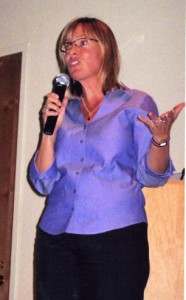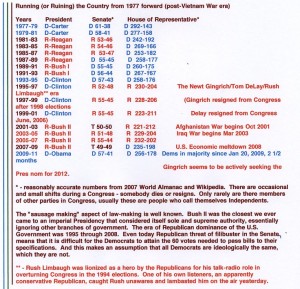#187 – Dick Bernard: Watching Tiger Woods
NOTE COMMENTS at end of this post.
You don’t need to know me very well, or for very long, to know that I’ve never been a fan of golf. I once was told I swing a golf club like a baseball bat. It’s probably true. I’ve never had a lesson.
So, why did I spend all Saturday and Sunday afternoon watching the Masters at Augusta GA, or, rather, watching Tiger Woods?
Before the first swing of the Master’s I predicted that Woods would finish in the top five. I had no basis for this guess. I didn’t think he’d win and “Top five” seemed pretty good. In the end, he finished in a tie for fourth. (I didn’t put the ‘evidence’ of my prediction somewhere, like writing an e-mail to myself: now I wish I had.)
I had never really watched Woods play golf before. This was an opportunity to see how he played, but equally as interesting for me, was to see how he would be played by the assorted interests that have been following his every move, particularly in the last five months.
He really played his role perfectly.
In this society which worships competition and winners and the perfection which accompanies success, it’s hard to find anyone as competitive as Woods. He was raised by his Dad to win. And he plays to win, it seems, fair and square.
Still, I wasn’t prepared for his unwillingness to at least pretend to be happy to have finished fourth. He said, in the brief interview after the 72nd hole, that he came to the Masters to win, and he didn’t, and that wasn’t pleasing. In reality, he was reacting exactly as a highly competitive winner is supposed to react: dissatisfied with anything short of perfection. In an individual sport, which golf is, the player has only him (or her)self to blame.
And Woods wasn’t perfect. Even I could see that.
There was one green near the end of the match where he earned a very sloppy bogey. The Associated Press writer described it as “an inexplicable three-putt from 6 feet [which] ended his hopes at the 14th.” His performance looked like I would have looked on most any green, most any time I’ve been unfortunate enough to be on one. And, on occasion, he even ended up in the woods, or stuck in a sand trap.
Still, given five months absence, and returning under what had to be incredible pressure, he finished tied for fourth in one of the most prestigious golf matches in the world.
For all the piousness and clucking about Woods abundant personal failings, Tiger Woods was a gold mine for professional golf and for the media last week. Suddenly, golf terms became respectable double entendres used on-air by people in the respectable media. What appeared to be his single ad for Nike will probably net Nike a bundle, long term, and was great fodder for endless spoofs and interpretations of it by others. But the company’s who advertised on the shirts and caps of the other golfers made out like bandits too. I would suspect I was not the only fair weather fan watching the Master’s this year. Woods was a bonanza.
Much was made of the gallery at Augusta. How would they react to Woods, and he to them? Fact of the matter: they were there, and they were among the very privileged few who had the chance. They loved the spectacle, up close and personal.
Has Tiger learned his personal lesson? Who knows. He’s human, still young, constantly in the spotlight, a celebrity among celebrities. Will his marriage survive? Who knows that, as well. He and his wife are human. There will be a lot of “cost” whatever the decision is, for he, his wife, his kids…. He will stay under the klieg lights for far longer than the rest of we mere mortals.
For me, I’m happy I watched the Masters. And I’m gratified that, as awful a golfer as I am, on one or two holes last weekend I might have matched Tiger Woods!
I only wish I would have made a wager with somebody about my prediction about how he’d do in the Masters.
COMMENTS:
Will S: Like everyone else who has screwed up one way or another, Tiger Woods deserves another chance. But it isn’t the public’s to negotiate, it’s his wife.
Not many people know that Woods operates a Learning Academy near San Diego. You can find out what it’s all about on the internet. When the revelations about his personal life began to emerge, I wrote the academy and told them no matter how his personal life shakes out, he should continue the Academy and in fact I suggested he open a second one in the Twin Cities. That, apparently, is not going to happen or at least not in the foreseeable future.
Of course, he is marked for life with his own scarlet letter but his redemption, if it comes at all, will not be on the golf course but with his wife and family.
As one who has done more than his share of screwing up, I wish him well and his wife and children, as well.
Jeff P: Professional golf had two “goldmines”:
a) the publicity on Woods lead up to the Masters and his participation;
b) Phil Mickelson’s win and his heartfelt seemingly endless hug of his wife after leaving the 18th green.
In the morality play of America, Tiger played his role, but the guy in the white hat triumphed.
Bob H: You caught the essence of Tiger Woods and too much of U.S.: Win at all costs; be number one. And like the man who was interviewed who had been bilked by a fraudulent ticket for the Minnesota Twins opener, he was satisfied that he had come at least because he had seen the “fly over.”
Now whatever a “fly over” has to do with a sport and how many of hundreds of thousand or our tax dollars went to that momentary spectacle confuses and worries me. That a military connection and ignoring cost and power is related to our national malaise about winning at any cost is worth it!
Check out our nation’s priorities here:
Paul M: Good analysis – the muffed 3 putt is very rare by Tiger standards, maybe a first, he has always said he only wants to win even as a rookie when the seasoned pro (Curtis Strange) said he will get over that. Tiger and Michael Jordan represent US sports at its cutthroat best (or worst), they will step on their own wives to win/get pleasure, you prediction was spot on, you should have bet, and been a winner.





